I have wanted to attempt to play the Najdorf as Black for some time. Watching Morelia-Linares has just added to my appreciation for this deep and complex opening. Recently I have started throwing it out in some blitz games, even at the club revealing parts of my preparation. It's fun, no doubt about that. Last night I went to Borders before the club because Chris Harrington and Nate Garingo often are there before they go to the club and I wanted to hang out for a bit. So Garingo and I end up playing blitz and I was playing the Najdorf every opportunity with Black, he was playing the English Attack (6.Be3) and I was getting good positions. But I knew from his games with Fischer that he plays 6.f4. Anyways Garingo and I were slated to play at the club and I was getting Black. I had considered looking over some analysis in the Najdorf before going to the club but I had decided to play my Accelerated Dragon instead. At the board, around move 2, I changed my mind and played d6....
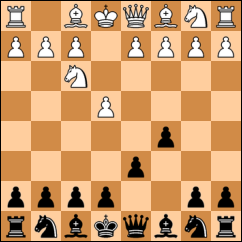
So this is where we start. Before I get into the game, I think this is a good time to talk about Nate Garingo. I moved back to Reno in mid-July and immediately started attending the Reno Chess Club every Thursday, Garingo showed up at the club the same Thursday to play his first game at our club. He was sporting a 2170 provisional rating and he played my kind of chess. Attacking chess, a strong knowledge of theory, highly tactical, basically just pure excitement on the board. Anyways so we rattle off three straight wins in three straight weeks and then we were due to face each other for the first time. I had Black (the game last night is the fourth time I have had Black in a rated game against him, I have had White once). I played some very provocative moves but actually found a pretty equal position where things were going to settle down. At this point he decided to sacrifice a piece, it didn't look so bad and I was a little intimidated (I definitely have to post this game soon). Anyways I put up a very stubborn defense and won the game. Our next game, I was Black again and he crushed me in the Maroczy, this game is in the Reno Chess Archives but I will probably also publish this eventually. I think we definitely have a lot in common and we play with a similar style, so there is a mutual respect. I had to earn it by winning the next two games, but nonetheless. We also consistently show up and demonstrate a love for the game that it seems like some of the other strong players in the area are lacking due to their absence. Anyways, coming into this game I was 3-1 against him in rated games and had also swindled an exhibition game so I was expecting a tough bout.
Now let's talk about the game. The moves so far were:
1.e4 c5 2.Nf3 d6!?
I don't think I've ever played this d6 before in a rated game. Maybe when I was much younger. I picked up the book Accelerated Dragons at the Western States when I was 13 or 14 and I have played this opening ever since (It starts 2...Nc6, more information here). Every opportunity, sometimes 3 times in one tournament, this opening is my bread and butter. Recently my results in this opening have been only so-so however, so I changed my approach and I wanted to play the new line, but I'm saving it for the Club Championship. So then I was thinking maybe just go into the Maroczy and play my little heart out but this seemed like such a waste. This tournament is completely pointless (there are only 4 players) and he is rated above me so nothing to lose right? So I played this move and I could tell it caught him off guard a bit.
He looked at this position for a few minutes, as if he was going to reject my challenge and go into some Anti-Sicilian, so I got up and walked around and then we fired off the next few moves.
3.d4 cd 4.Nd4 Nf6 5.Nc3
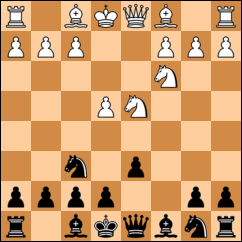
Black has five very popular options here: 5...Nc6 is the Classical Sicilian, 5...e6 is the Scheveningen, 5...e5 is the Sveshnikov, 5...g6 is the Dragon, and 5...a6 is the Najdorf. I feigned at the g pawn (the dragon is Garingo's opening) just to see how he would react. Then I grabbed the a pawn and hoped for the best.
5...a6 6.f4
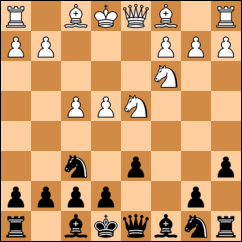
6.f4 is a sideline, but it still packs a punch. Garingo has been having no problem against Fischer's Najdorf with this line although Fischer plays 6...g6 at this point which seemed to me to be inconsistent. I wanted to discuss a different topic and see how Garingo handled himself. At this point Black's most common moves are 6...e6 and 6...e5 and I had looked at them both about a month ago when I was thinking about taking this up against Garingo specifically. If Black plays 6...e6 then White can immediately play 7.a4 and prevent 7...b5. Then the b pawn should go to b6 and Black gets a hedgehog formation. This is absolutely playable for Black but I wanted to keep things in the style of the pure Najdorf so I chose the other option.
6...e5 7.Nf3 Qc7 8.Bd3 Be6?!
I think I misplaced the bishop here. Because White has left out a4 I could play b5 intending Bb7 here and I think this is the way to play. I have been so used to seeing the English attack with the pawn on f3 when the Bishop goes to e6. But with the pawn on f4 the e4 pawn is already feeling weak, and the Bishop on b7 puts additional pressure on the weakness.
9.0-0 Nbd7 10.a4 Be7 11.Kh1 0-0 12.Qe1

This position has actually been played some 20 times in my database. Black has for the most part stuck to the plan of Re8 with Bf8, something I was only able to spot after it was provoked by White's next move. I was a little lost here, I didn't really have any good ideas. I noticed earlier that I could play Bc4 if White tried to trap the Bishop with f5, and I started thinking maybe of plans with b5 so I played:
12...Bc4 which has been played one time in my database quite unsuccessfully.
One of the ideas here was something like ...b5 ab ab Nb5 Bb5 Bb5 Qc2 keeping material level and adding pressure from the queen on e4, it is a very strong idea in case of a move like Be3. Of course White doesn't have to capture the pawn on b5 in this case but I thought b5 was important. Also maybe trading on d3 and f4 and bringing a knight to c5 or e5 (or both) and putting pressure on the weak pawn. Then I started to realize that the d3 pawn could go to d4 and this would be bad. So really this move was pretty pointless as you will see. Nathaniel was up to the task.
13.Nh4!
Exploiting my Bishop's absence from e6, the knight heads to f5, I must regroup to maintain the dark squared Bishop, a key defensive piece.
13...Rfe8 14.Nf5 Bf8
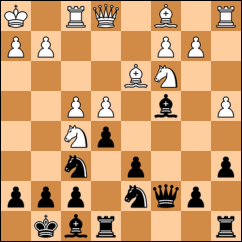
So White has succeeded in getting his knight to f5 and now must decide how to increase the pressure.
15.Rf3?
White makes it clear that his intention is to attack on the h file. This is a little bit intimidating, he's going for Rh3, Qh4 and then opening the center and mate. But this move is slow, Fritz gives a few alternatives that may promise White a slight pull into the late middlegame.
For instance 15.fe. I almost certainly would have taken back with the knight, which is the worse option. This would allow White to exert pressure on the center of the board and build up a lot of strength. In any case it is not as if there is one crushing move here for White. He must continue to build and a mistake from either side will drastically change the evaluation.
15...Be6!?=
I was very happy with this move. I was looking at a few options, there are other good options too, but I think that this is my favorite. Simply retreating the Bishop from it's failed expedition and threatening to exchange White's pieces on the kingside, which would weaken the attack. It's just such an awkward move, you wouldn't think that Black is achieving equality with this move, it looks like he is getting desperate. Looks can be deceiving and Garingo lets down his guard.
16.Ne3?
This move is intimidating, but weak and I sniffed out a response that solves all my opening problems and probably leaves me with a slight pull. Again 16.fe or 16.Qh4 are consistent. What Black needs to see to solve this position is that with the knight on e3, White is unable to recapture on f4 with the bishop, I had been waiting to initiate this exchange and now is the time:
16...ef! 17.Rf4 d5!
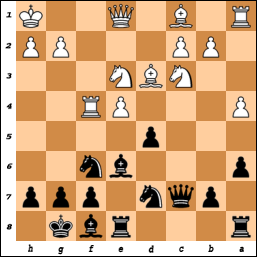
And d5 comes with tempo on the rook, this just couldn't be wrong! I felt very good about my position until:
18.Qh4!
I overlooked this response, I thought White had to address the threat of d4 winning a piece but Nd5 attacking the queen allows White to continue without losing a piece and he may even be better after the move d4. So now I had to come up with something...
18...Qe5!?
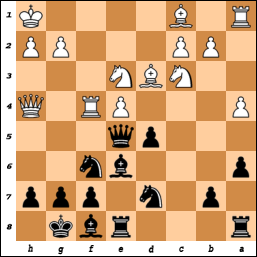
This is an interesting move to say the least. The tactics in this position are a little bit ridiculous. The Bishop on d3 that I didn't trade is menacingly looking down on the h7 pawn now that the e pawn is free to roam. This is what caused me to reject 18...dxe4!, which turns out to be safe after 19.Ne4 Ne4 20.Be4 h6. h6 is such a simple move, but it was hard to see in the midst of all the complications, also I felt like this was the kind of position that he wanted, the attack goes on.
After Qh4 I sunk into a deep think and decided that the most important feature of the position was that the Q and R were vulnerable on their squares, if for instance I could get a knight to g6 this would be strong, but Ne5-g6 doesn't accomplish anything since after 18...Ne5 19.ed Ng6 White just wins a piece by 20.Bg6 and 21.de6.
But there's another way to fork these pieces, albeit ugly and awkward, g5! So Qe5 threatens g5 when Black will beat back the White pieces and also removing the Queen from c7 threatens d4 which would win a piece. So there are two threats, this is always good right?
19.exd5 g5!
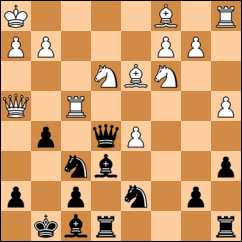
It worked!! There is a good alternative for White that does not allow this. 19.Nf5, returning the knight to f5 was suggested by Nathaniel immediately after the game and leads to a very double-edged game with chances for both sides. This move addresses both threats, it removes the knight from the fork and blocks the queen from defense of g5.
Here's an interesting line: 19.Nf5 de 20.Ne4 Ne4 21.Re4 Qf6! I suggested this as the way to play for Black and it equalizes but the game remains wild: 22.Bg5! Qb2 with chances for both sides, here's how it looks:

Back to the game:
20.Ng4?? This move loses on the spot.
White still had a way to keep himself in the game. Nathaniel, like me, is the kind of player who feels the advantage and at the point where he realizes he may not be in control he panics and oftentimes this is where he makes his weakest moves. If you have seen our last two games (here and here) there is additional support for this statement. So the way to stay in the game is:
20.Nc4! Qf4 21.Bf4 gh 22.de fe when Black is up the exchange, but there is still a chess game to play:
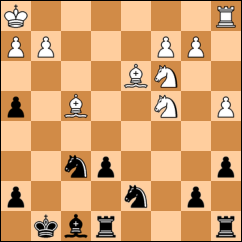
20...Bg4 21.Qg3 forced, if White takes the Bishop he gets mated on e1. 21...gf 22.Bf4 Qh5 23.h3 Kh8 0-1
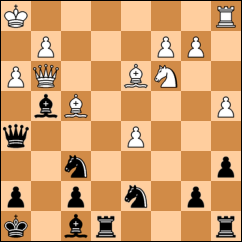
I step out of the pin and save the bishop, leaving me up a rook and a knight for two pawns, White resigns.
So now I have two systems against e4, although they are both Sicilians. I don't think I'll play the Najdorf at the Far West Open in two weeks but you never know. I certainly had a good showing in this game.
By the way let me know what you think of the format, I'm just so tired of the little chesspublisher window.
Read More...
Summary only...











